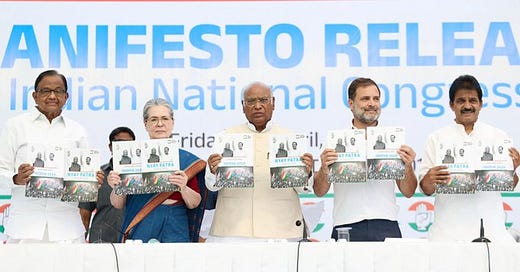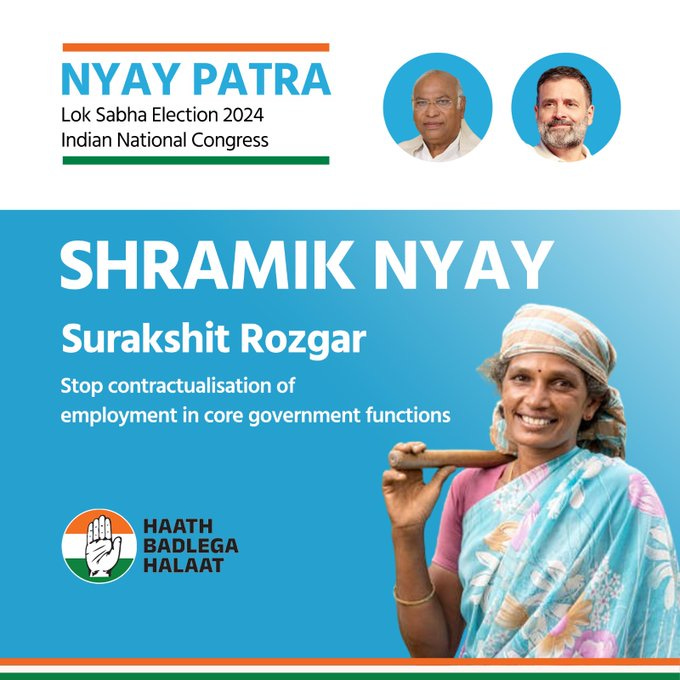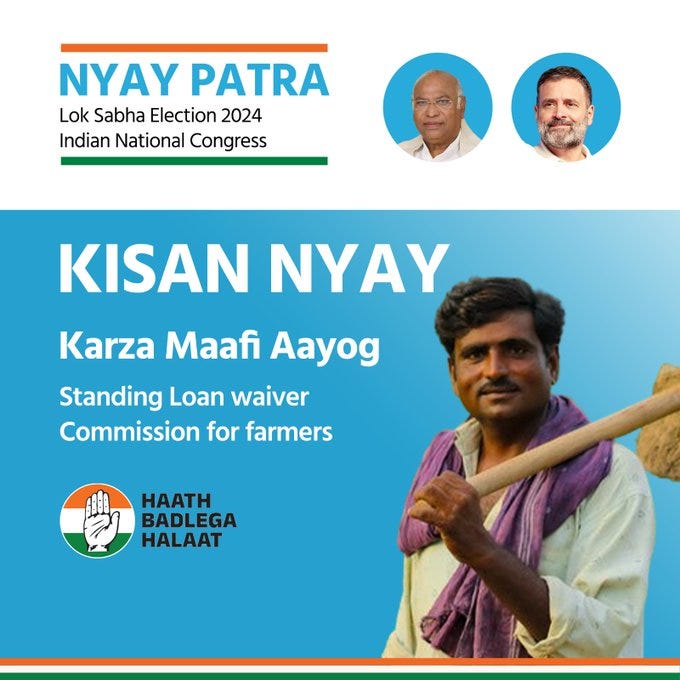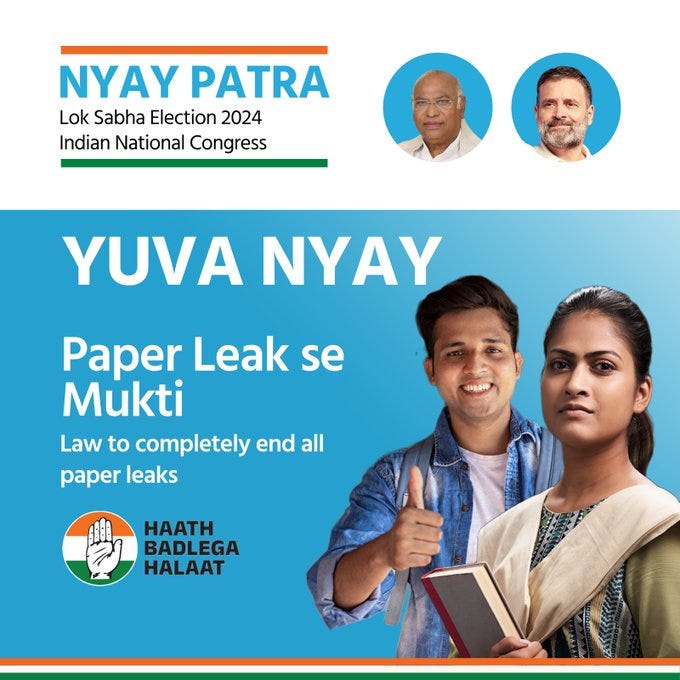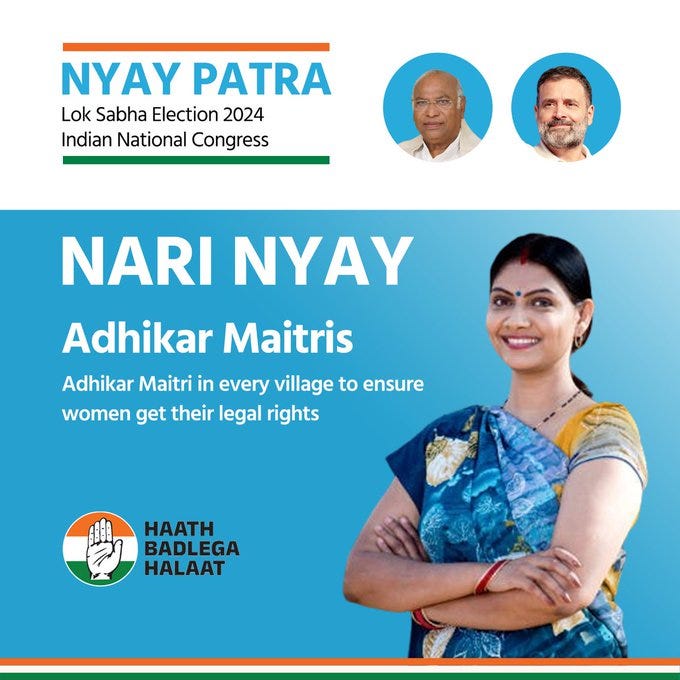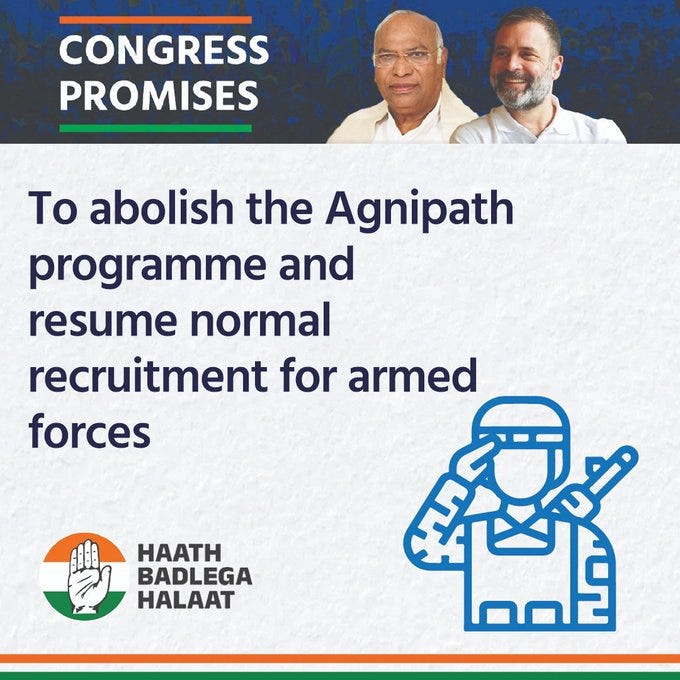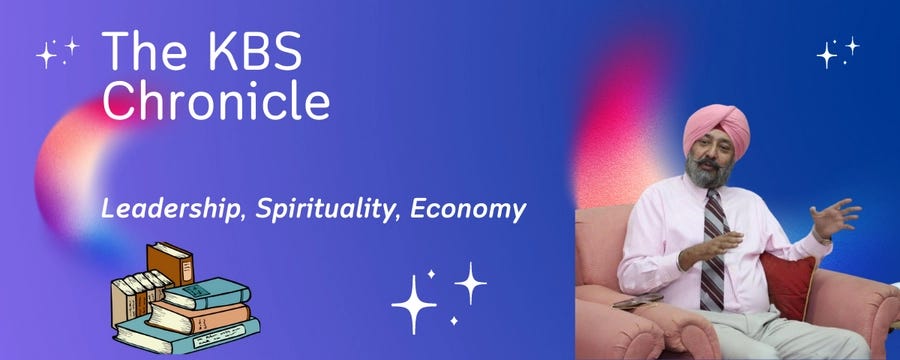Congress Manifesto: A Utopian Vision for Comprehensive Justice
Everything for everyone BUT— "How shall it be funded"? No answers.
Analysing the Congress Party's 'Nyay Patra'
In the significant presence of key Congress leaders—Rahul Gandhi, Sonia Gandhi, and the Party President, M. Mallikarjun Kharge, an event marked with anticipation today unveiled the party’s manifesto for the upcoming Lok Sabha elections. Delineated as per the broad vision of Rahul Gandhi and crafted under the vigilant guidance of the former Finance Minister, P. Chidambaram, the manifesto, ambitiously titled 'Nyay Patra' (न्याय पत्र), seeks to chart a course towards an equitable future for India.
It boldly outlines a quintet of justice-oriented pillars: 'Yuva Nyay' (युवा न्याय, Youth Justice), aiming to empower the nation’s youth; 'Naari Nyay' (नारी न्याय, Gender Justice), dedicated to championing women’s rights and equality; 'Kisaan Nyay' (किसान न्याय, Farmers' Justice), focusing on the upliftment of the agricultural community; 'Shramik Nyay' (श्रमिक न्याय, Workers' Justice), targeting the rights and welfare of the workforce; and 'Hissedari Nyay' (हिस्सेदारी न्याय, Equity Justice), promising a fair share in the nation’s progress for every citizen. This manifesto stands not only as a political declaration but also as a vision document aimed at tackling the multifaceted aspects of justice within the Indian socio-economic landscape. It emerges in the context of the upcoming Lok Sabha elections and against the backdrop of Prime Minister Modi's 10-year tenure, presenting an alternative narrative for India's path forward.
Unpacking the Vision of 'Nyay Patra'
As the Congress Party released its 'Nyay Patra' manifesto ahead of the forthcoming Lok Sabha elections, it presents a bold vision aimed at addressing the multifaceted challenges facing India today. While it's beyond the scope of this article to delve into minute details of the manifesto, best summarised on the “X” (Twitter) handle of the Party, we highlight ten cornerstone proposals that encapsulate the essence of the Congress Party's pledge to the nation. These initiatives range from socio-economic reforms to structural changes in governance, each representing a step towards a more inclusive and equitable society. Here's a closer look at these key points, shedding light on their potential impact and significance.
1. Nationwide Socio-Economic and Caste Census
The manifesto proposes conducting a comprehensive socio-economic and caste census, a pivotal move to map the current realities of India's diverse population. This initiative aims to gather essential data, enabling targeted policy interventions for those in dire need, thereby ensuring that developmental policies are crafted with precision and inclusivity at their core.
2. Raising the Cap on Reservations
Addressing the long-standing demands for greater representation, the Party vows to pass a constitutional amendment to raise the 50% cap on reservations for SC, ST, and OBC communities. This is seen as a significant step towards correcting historical injustices and enhancing the social fabric of the nation by ensuring fair and equitable access to opportunities.
3. Quota for Economically Weaker Sections
The manifesto commits to implementing a 10% quota in jobs and educational institutions for Economically Weaker Sections (EWS) across all castes and communities. This policy aims to bridge the economic divide, offering a lifeline to those marginalized by their financial circumstances rather than caste or community.
4. Right to Apprenticeship Act
Promising to empower the youth with practical skills and experience, the Congress plans to introduce a 'Right to Apprenticeship Act'. This act will guarantee a one-year apprenticeship opportunity for every diploma holder or graduate below the age of 25, potentially transforming the employment landscape for young Indians.
5. Legal Guarantee for MSP
In a significant move to support the agricultural sector, the manifesto includes a legal guarantee— through a Central law— for Minimum Support Prices (MSP), ensuring that farmers are fairly compensated for their produce. This pledge seeks to safeguard farmers' interests and secure food security for the nation.
6. Restoring Full Statehood to Jammu and Kashmir
The Congress Party firmly commits to immediately restoring full statehood to Jammu and Kashmir, aiming to heal the wounds of the past and lay the foundations for a peaceful and prosperous future in the region.
7. Abolishing the ‘Agnipath’ Programme
Addressing concerns within the defence sector, the manifesto promises to abolish the ‘Agnipath’ programme and revert to normal recruitment processes to achieve full sanctioned strength in the Armed Forces. This move is intended to ensure stability, career progression, and operational efficiency within the military.
8. Rajasthan Model for Universal Healthcare
Drawing inspiration from the successful Rajasthan model, the manifesto proposes a universal healthcare scheme offering cashless insurance of up to Rs 25 lakh. This ambitious plan aims to ensure that no Indian is denied access to quality healthcare due to financial constraints.
9. Ending Contractualisation in Government Jobs
In a bid to secure job security and workers' rights, the party pledges to abolish contractualisation of regular jobs in government and public sector enterprises, ensuring the regularisation of such positions. This policy is aimed at providing stable and dignified employment for millions.
10. Urban Employment Programme
Recognizing the critical issue of urban unemployment, the manifesto proposes an urban employment programme guaranteeing work for the urban poor. This initiative is designed to rejuvenate urban infrastructure while providing meaningful employment opportunities to those in need.
Summing Up
Each of these proposals embodies— as per their spokespersons— the Congress Party's vision for a just and progressive India, promising a roadmap to address the pressing issues of our times through thoughtful and inclusive governance.
Our Critical Appraisal
Navigating Reservation Reforms: Balancing Equity and Unity
While the Congress Party's 'Nyay Patra' manifesto articulates a vision for an inclusive and equitable India, certain propositions, notably the breach of the 50% reservation threshold and the advocacy for 50% reservation for women in central government jobs, may stir concerns among the general category candidates and male youth. These proposals, aimed at rectifying historical injustices and promoting gender equality, risk alienating a significant section of the populace. The apprehension is not merely about the erosion of opportunities for the general category but also about the potential for creating fissures in a society striving for unity and fairness. The manifesto’s silence on managing the delicate balance between affirmative action and meritocracy raises questions about the repercussions on social harmony and the competitive spirit among India's youth.
The Economic Conundrum: Funding the Vision of 'Nyay Patra'
Moreover, the manifesto's ambitious agenda, while laudable in its intent to uplift various segments of society, leaves a critical question unanswered: How will it be funded? The absence of a clear financial blueprint to support these extensive promises adds a layer of scepticism to their feasibility. Given Mr P. Chidambaram's significant role in drafting the manifesto, the onus falls on him to elucidate the economic and financial underpinnings of this vision. The Nation awaits a detailed explanation on whether the implementation of such a wide-ranging set of policies would necessitate additional borrowing, leading to a higher fiscal deficit, or if it would trigger inflationary pressures through increased money printing, described in the economists’ jargon as ‘monetising the deficit’. Alternatively, would it require hiking taxes, thereby burdening the common citizen and potentially slowing economic growth? The manifesto’s ambitious nature begs for clarity on its fiscal strategies to avoid casting it as a utopian dream detached from the economic realities of India.
Manifesto Musings: Promises Versus Pragmatism
In essence, the Congress Party's 'Nyay Patra' manifesto emerges as a theoretically compelling narrative, ambitiously pledging transformative changes, especially in the arena of reservations. However, its exuberant promises tread into overambitious territories without a clear roadmap for funding, casting shadows of doubt on its feasibility. In a scenario where manifestos remain non-binding and the electorate's perceptions are shaped by immediate concerns such as inflation, unemployment, and law and order, the grand visions outlined risk being perceived merely as rhetorical flourishes.
The widespread belief that the Modi-led NDA will secure a substantial majority further dilutes the manifesto's perceived impact, confining discussions to fleeting media debates and intellectual circles, removed from the everyday priorities of the layperson. The manifesto's ultimate challenge lies in transcending the binary of being seen as either a benevolent provider of immediate relief or a visionary architect of sustainable empowerment. Echoing the sentiment of a Congress wag: "Everything for everyone=Nothing for no one", the electorate is left to navigate the complex interplay of promises and practicality, drawing their own conclusions in the face of such ambitious declarations.
Regarding whether 'Bhagidari Nyay' (भागीदारी न्याय) would have been a preferable choice over 'Hissedari Nyay' (हिस्सेदारी न्याय), the jury is till out.

